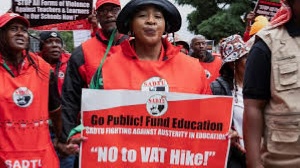Africa News of Thursday, 24 April 2025
Source: www.ghanawebbers.com
ANC U-turn over tax that threatened South Africa's government
South Africa's President Cyril Ramaphosa has reversed a proposed VAT rise.
The African National Congress (ANC) suggested the hike, but it faced strong opposition. The Democratic Alliance (DA), the ANC's main coalition partner, opposed it fiercely. Other opposition parties also joined in the resistance.
The 0.5% tax increase was set to take effect soon. The finance ministry announced the reversal after talks with political parties and parliament. However, they warned this decision would create a significant revenue deficit.
This shortfall is estimated at 75 billion rand ($4 billion; £3 billion). As a result, other tax increases or spending cuts may follow.
Many South Africans will likely welcome this news. They are already struggling with a stagnant economy and rising living costs.
Finance Minister Enoch Godongwana had supported the VAT increase. He argued it would help protect vulnerable citizens from other tax measures. However, he faced pushback from various political groups, including some within his own party.
On Thursday, Godongwana stated that not increasing VAT means revisiting expenditure decisions. He noted that measures to support lower-income households must now be withdrawn.
The minister plans to introduce a revised spending bill in the coming weeks. In February, he postponed his budget presentation due to strong resistance against the VAT proposal.
The DA claimed that raising VAT would worsen economic inequality and living costs. They welcomed the reversal of the proposed increase as a victory from their court challenge but emphasized that their fight continues.
At a media briefing, DA chairperson Hellen Zille highlighted their role in stopping harmful policies. She stressed their commitment to promoting economic growth and responsible public spending without raising taxes further.
This controversy arises during tough times for the government. About a quarter of South Africans are unemployed and depend on government support. The treasury has warned of increasing pressure on public finances.











